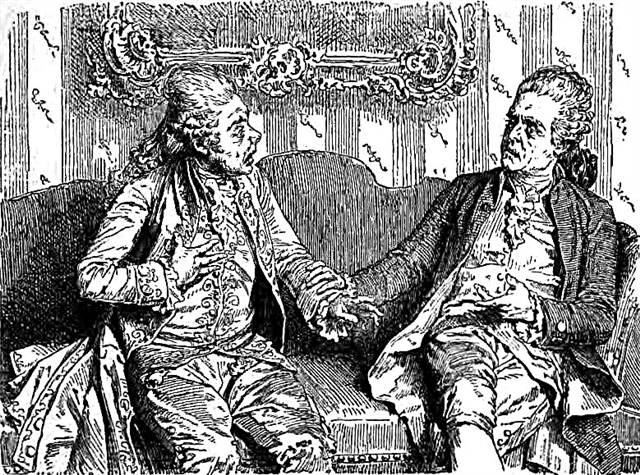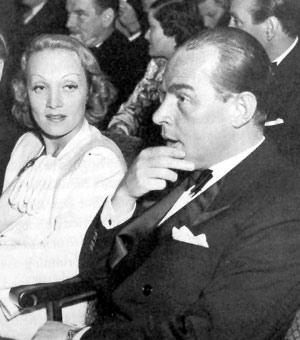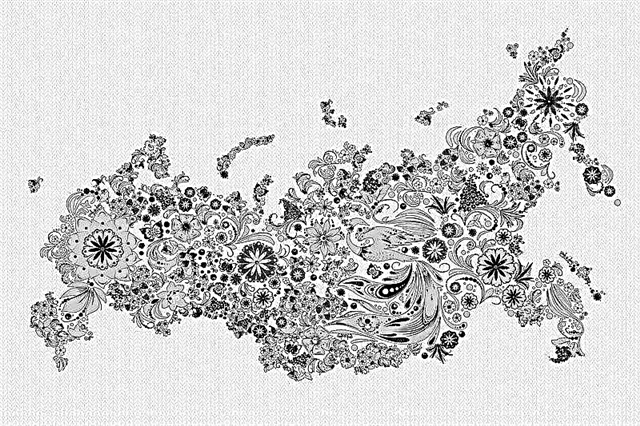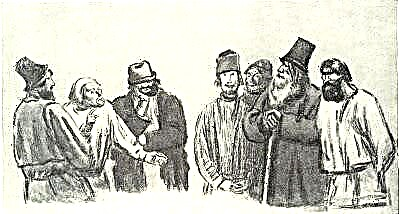“The Tale of the Fisherman and the Goldfish” is perhaps the most famous tale written by A.S. Pushkin. Enjoy reading!
Shortest content
The author begins the tale by describing the poor life of an old man and an old woman. For long 33 years they live in a dilapidated hut by the sea. The old woman is doing housework, spinning. The old man catches fish, this is what they eat.
And then one day a wonderful incident occurs with the old man: he accidentally catches an unusual goldfish with his net, which in a human voice asks him to let her go back to the blue sea. And in return she promises to fulfill any desire of the old man. The kind old man marveled at this miracle and let the goldfish go back to sea, without asking for anything in return. He returned home and told everything to his old woman. And she began to swear at him - they say, she had to at least ask for a new trough, because the old one was completely moved. There was nothing for the old man to do - he returned to the sea, and the sea began to worry a little. He called a goldfish, she sailed, listened to the old man's request and promised to fulfill everything. The old man returns to the hut and sees that there is a new trough, but the old woman is again unhappy. Go speak again to the fish and ask her for a hut. Again the old man went to the sea, which was already storming, and began to call for a fish. Again she sailed and performed everything.
But the old woman is again not happy. Go, he says, to the fish for the third time, and ask the tower instead of the hut, and make me a “pillar noblewoman”. And again, everything was done by a goldfish. But the old woman’s appetite knows no bounds. She sends the old man to the fish for the fourth time and asks to make her “free queen”. The old man can hardly shout to the fish through a storm. The sea is in earnest. Nevertheless, the fish comes up and fulfills the request of the old man.
However, after a while the old woman was tired of being the “free queen” too and she sends her husband back to the sea. But this time, she came up with, in her opinion, the most cunning desire. She wished to be the “mistress of the sea”, to move to the bottom of the ocean, and the fish to go in her servants and fulfill all her wishes in an instant. The old man was very sad, but still went. At sea, we already see a terrible storm. The fish sailed, listened to the old man’s request, but didn’t answer, but only slapped her tail in the water and sailed away. Waited, waited for the old man a fish, but she never returned. I went towards the house. He returns and sees his old coat and an old woman with a cracked trough. The end.
Feedback
I must say, "The Tale of the Fisherman and the Goldfish" led me to complete delight. She talks about simple truths, about those basic things that every good person should learn. First of all, of course, the tale reveals greed and excessive ambition. The old woman could stop at the trough or, at worst, at the hut. But no, her greed knows no bounds - she wants to be the queen, and then the mistress of the sea, absolutely not deserving of these titles. Inside, she is the same ragged old woman who lives in an old coat. But she needs to prove to the whole world (but actually to herself) that this is not so. Her ambitions are completely unsupported spiritually. In her family, as in herself, there has long been no love. She forgets about inner wealth, filling the world around herself with only material things, which ultimately leads to the collapse of her desires and a return to her former life.
The old man as a whole is a positive hero. We see in him both sympathy and no glimpses of generosity, because he released the goldfish for the first time “for no reason,” he himself does not need anything. He is simple and content with what he has, even if it is a very modest life. But the old man has one very bad trait - he is weak-minded and cannot object to his distraught old woman, although he sees that she has finally lost her conscience. The fish itself sympathizes with him and regrets, which is why it comes to his pleas again and again.
And the fish, in turn, behaves very restrained and wisely. She is like a universe, or a god who answers prayers or doesn't answer. Grants or leaves with nothing. Perhaps in a figurative sense, this is so.
There is another hero in this fairy tale and Pushkin describes him in a very colorful and artistic way. This is the Sea. It “lives” with the heroes of the story, in fact, is a reflection of the plot. The storm at sea is becoming more and more violent with the growing appetite of the old woman. We see and clearly feel the mood in which the goldfish is, thanks to the sea. She is furious, she is upset, she punishes the old woman. But the fish itself does not show any emotions, only slaps its tail in the water. A reflection of her anger becomes a sea storm.
The finale of the tale is expected and joyful for the reader, justice has triumphed. The old woman was punished, and in a very wise way - she would have to live in her old house and wash in a broken tub. This is such justice without cruelty. I hope that the old woman will learn a lesson from this and understand how greedy and greedy she was.
The main idea of the tale is that one should always reinforce his excessive ambitions with spiritual wealth. If you develop the material side, do not forget about the spiritual. The old woman’s example is very instructive - she completely lost her mind and no longer wanted to reckon with anything. I think the fairy tale is quite relevant in our days. Old women and goldfish are found to this day, only dressed more modern. But, as a rule, similar stories end anyway according to the old scenario.












